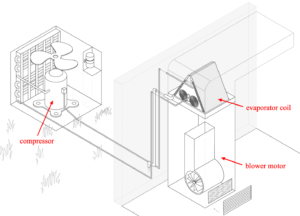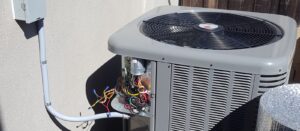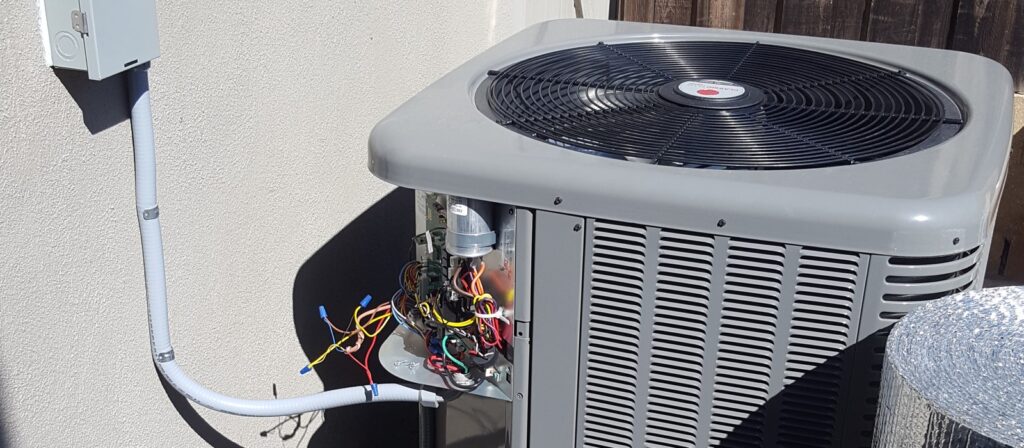Ever wanted to know if your heat pump can run without Freon? The answer is, technically, it can. But without it, your heat pump will not deliver warm or cool air into your home—so running your heat pump is pointless.
Running a heat pump without Freon can also damage essential components and potentially ruin the system altogether. For those reasons, we do not recommend turning on your heat pump if you know it’s low on refrigerant. Instead, you should contact a professional to fix your heat pump.
We know you probably have more questions. In this article, we’ll explain the following:
- Why Freon (refrigerant) is essential to the heating/cooling process
- What causes a heat pump to lose refrigerant
- Signs your heat pump needs Freon
Note: Freon is the brand name of a specific refrigerant type used in older heat pumps. Most people use the name Freon to refer to refrigerants in general. In this article, we’ll use the terms “Freon” and “refrigerant” interchangeably.
Why Freon (Refrigerant) Is Essential to the Heating/Cooling Process
As mentioned above, a heat pump needs refrigerant to cool or heat your home. It’s so vital that HVAC professionals often refer to Freon as the “lifeblood” of a heat pump because it dramatically impacts the heating and cooling processes.
To help you better understand its importance, let’s take a closer look at how your heat pump uses refrigerant in the heating and cooling cycles.
Refrigerant’s role in the cooling cycle
When your heat pump is working in cooling mode, it operates just like a standard air conditioner. Instead of creating cold air directly, an air conditioner cools your home by removing heat from indoor air.
Here’s how the heat-removal process works: The indoor unit of your heat pump blows warm air over a component called the evaporator coil (pictured below). Inside this coil, liquid refrigerant absorbs heat from the warm air blowing over the coil.

In cooling mode, the refrigerant absorbs heat at the evaporator coil.
Your heat pump pushes the cool air into your home, but the process doesn’t end there. The refrigerant—which has now turned hot because of the heat it absorbed—travels to the outdoor unit.
Inside the outdoor unit, a part called the compressor turns the hot refrigerant into a high-pressure gas. The high-pressure gas travels through coils around the outdoor unit, which helps the refrigerant release all of the absorbed heat into the outside air.
After the refrigerant releases the heat, it passes through the expansion valve, which helps cool the refrigerant back down to a liquid. The cold refrigerant returns to the indoor unit to absorb more heat, and the process repeats as long as the thermostat calls for cool air.
For a more detailed explanation of the cooling process, refer to our blog, “How Does Central Air Conditioning Work? A New Jersey Tech Explains.”
Now that you know how a heat pump operates, you can see why refrigerant is the “lifeblood” of the system. Without it, your heat pump can’t cool or heat your home.
What Causes a Heat Pump To Lose Refrigerant

Your heat pump doesn’t ever use up refrigerant like a car uses gas. Instead, your heat pump constantly circulates the same refrigerant between the indoor and outdoor units in a closed loop.
Refrigerant travels between the indoor and outdoor units via copper lines.
Since a heat pump doesn’t consume refrigerant, the only way your heat pump can lose refrigerant is if there’s a leak somewhere in the system.
Refrigerant leaks typically develop in the following locations:
- The evaporator coil (indoor unit)
- The condenser coil (outdoor unit)
- The copper refrigerant lines that connect the indoor and outdoor units
Professionals can easily find the location of a leak using electronic leak detectors or via pressure tests. After a technician finds the source of the leak, they can repair or replace the leaky component. Then, the technician will add the correct amount of refrigerant to your heat pump.
Signs Your Heat Pump Needs Freon
The following signs indicate your heat pump may have a refrigerant leak:
- Uneven temperatures in your home
- Ice on the outside refrigerant lines
- Water leaking around the indoor unit
- A hissing or bubbling noise
If you notice any of these signs, you should contact an HVAC technician to inspect your heat pump and check for any refrigerant leaks.
Think Your Heat Pump Is Low on Freon? Let an Air Experts Technician Help.

When Monmouth and Ocean county residents need a reliable and fast heat pump repair, they call Air Experts. For over 25 years, our highly-trained technicians have serviced all kinds of heat pumps and repaired countless refrigerant leaks. When you hire us for your heat pump repair, you can count on transparent pricing, dependable repair work, and exceptional customer service 7 days a week.

